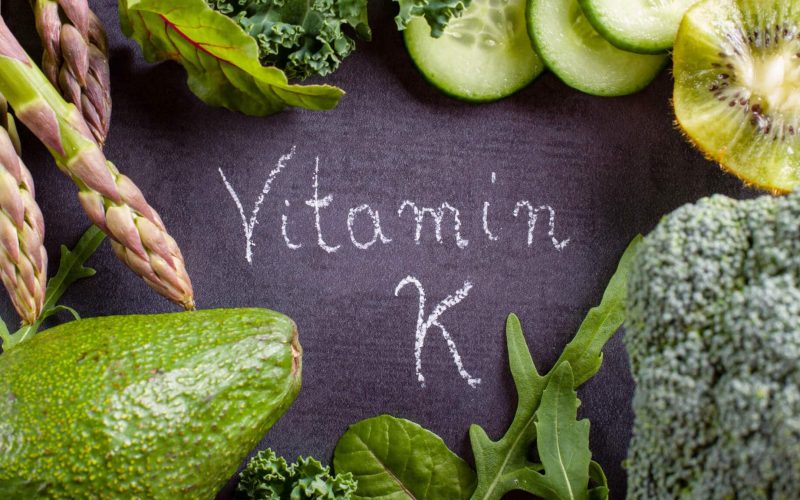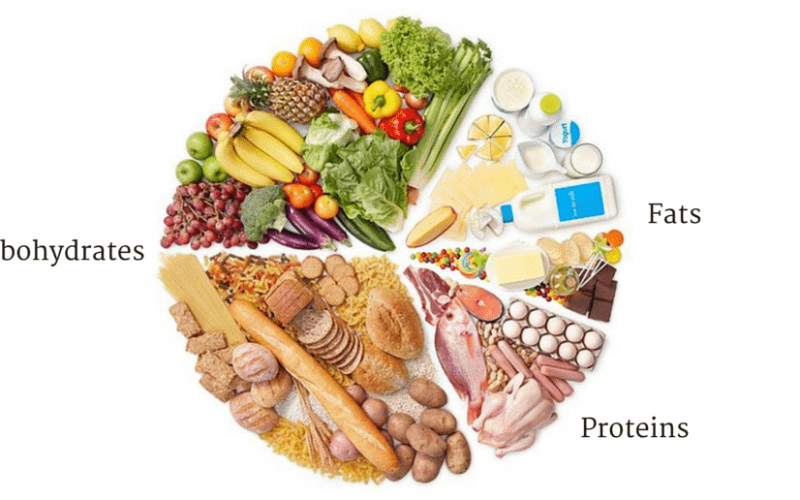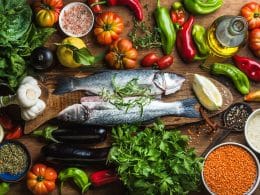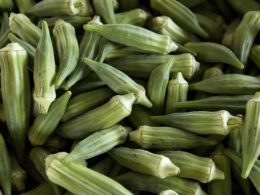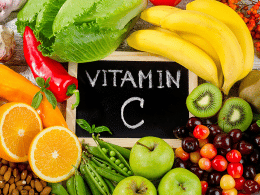Vitamin K belongs to the family of fat-soluble along with vitamin A, D, and E. It is an important vitamin that plays a vital role in several physiological processes.
Also known as the clotting vitamin, vitamin K is a crucial ingredient in the blood clotting process. without it, blood will not clot when you sustain an injury.
In fact, the “K” was taken from the Koagulation – the germ word for blood clotting.
This vital nutrient also has other health benefits including a reduction in the risk of bone fracture, strengthening bones in older adults, and helps in the prevention of vascular calcification which can result in coronary artery disease.
There is no identifiable risk of vitamin K toxicity unless you’re on blood-thinning medications like Warfarin or Coumadin.
In which case, the intake of vitamin K might have little effect on their potency.
Be sure to speak with your doctor or a dietician to help decide the amount of vitamin K intake your body needs.
Forms of vitamin K
This vitamin comes in 2 forms
Vitamin K-1: This is our main dietary source of vitamin K and is mostly obtained from plants, like okra, spinach, kale, lettuce, turnip greens and others.
Vitamin K-2: Our body produces this vitamin form from vitamin K-1 obtained from the food we eat. it can also be gotten from a few animal sources like cheese, liver and some fermented veggies like natto, a dish made from fermented soybeans.
Vitamin K-rich foods
There are numerous sources of vitamin K. Plants – especially leafy greens – are the major source of this nutrient but it can also be obtained from other food sources.
Here’s a list of top food sources of vitamin K
1. Kale
This is an excellent source of vitamin K. It also boasts a high content of vitamins A and C, calcium and potassium, earning it a spot in the list of superfoods.
Half a cup of this green leafy veggie when cooked contains 531mcg which is equivalent to 443% of your daily intake of this essential nutrient.
2. Natto
Natto is a dish of Japanese origin, made from soybeans fermented with a type of probiotics called Bacillus Subtilis.
Apart from being a good source of vitamin K, It is also high in a number of nutrient including copper, iron, manganese and calcium.
One ounce of Natto is packed with 261% (313mcg) of your daily value for vitamin K.
3. Spinach
Spinach is packed with all sorts of nutritional goodness including folate, magnesium and iron, plus vitamins A, B and E
A half-cup of cooked spinach contains 444 micrograms (370%) of your daily intake for vitamin K, so it’s a great plus to your diet.
4. Parsley
This is another K vitamin-rich veggie providing up to 574% (478 micrograms) of your DV. It is usually added to dishes to improve their taste, and thanks to its nutrient content, it offers a lot of health benefits.
It’s also a good source of iron and vitamins A and C.
5. Kiwi fruits
Kiwi is among the wide range of fruits rich in vitamin K. You can get up to 89 percent (74.2 mcg) of your DV for vitamin K from just one cup of this fruit.
Plus, you can eat them to fortify your immune system as they contain a high amount of vitamin C.
6. Blackberries
These fruits are highly nutritious as they contain powerful antioxidant properties, thanks to the presence of vitamin C.
They are also a good source of vitamin K, as one cup of blackberries can cover 36% of your required intake of this vitamin.
These berries also contain various minerals including manganese and copper.
7. Pickled vegetables (cucumber)
Pickled cucumbers are another healthy, and crunchy source of probiotics, which are essential for a healthy gut.
With nearly zero caloric content, a cup of this fermented food offers about 130 mcg of vitamin K, equivalent to 109% of its daily value
8. Collards
Collard greens or Collards is another green leafy vegetable like kale, that has an abundant vitamin K content.
A total of 552mcg (662%) of vitamin K can be obtained from half a cup of this vegetable when cooked. Plus, collard greens have a high content of vitamins A and C.
9. Soybeans
Soybeans – fermented or not – belong to the class of vitamin K-rich foods.
Eating half a cup of roasted soybeans will provide 45 micrograms of vitamin K – catering for 54% of your daily intake of this essential nutrient.
Moreover, they cover for a wide range of minerals and vitamins including copper, magnesium, manganese, and phosphorus with B vitamins such as folate, riboflavin, and thiamine.
10. Okra
Also, know as Gumbo or ladies’ fingers, okra is a warm-season vegetable known for its nutritional value.
It is a good source of several essential nutrients including folate, fibre, calcium, magnesium, potassium and vitamins C and K.
Half a cup of sliced, cooked okra packs 32mcg of vitamin K which is 27 percent of your recommended daily intake of the nutrient.
11. Beef liver
Beef liver is another powerhouse of essential nutrients. It is low in calories, rich in protein and packed with other essential minerals and vitamins including copper, iron, folate, and riboflavin.
It also contains a fair amount of vitamin K. Around 92 micrograms of this vital nutrient can be obtained from a 100gram serving of braised beef liver which is about 77 percent of the nutrients daily value.
Other good sources of vitamin K include
12. Green Beans (cooked)
- 100 grams: 40% RDI (48 mcc)
- Half a cup: 25% RDI (35 mcg)
13. Egg yolk
- 100 grams: 29% RDI (34 mcg)
- 1 large: 5% RDI (5.8 mcg)
14. Bacon
- 100 grams: 29% RDI (35 mcg)
- 3 ounces: 25% RDI (30 mcg)
15. Chicken
- 100 grams: 50% RDI (60 mcg)
- 3 ounces: 43% RDI (51 mcg)
16. Cabbage (cooked)
- 100 grams: 117% RDI (140 mcg)
- Half a cup: 68% RDI (82 mcg)
17. Broccoli (cooked)
100 grams: 118% RDI (141 mcg)
One cup: 183% RDI (220 mcg)
18. Lettuce
- 100 grams: 85% RDI (102 mcg)
- One cup: 47% RDI (56 mcg)
19. Asparagus (cooked)
- 100 grams: 42% RDI (52 mcg)
- One cup: 76% RDI (91 mcg)
20. Pork chops
- 100 grams: 57% RDI (69 mcg)
- 3 ounces: 49% RDI (59 mcg)
Recommendations
The required intake of this vitamin depends on your gender and age. Other factors like illnesses, pregnancy or breastfeeding can influence your daily intake of vitamin K.
The required intake as suggested by the Institute of Medicine Food and Nutrition Department is;
Babies
- 0 to 6 months: 2.0 mcg/day (micrograms per day)
- 8 to 12 months: 7.5 mcg per day
Children
- 1 to 3 yrs: 30 mcg per day
- 4 to 8 yrs: 55 micrograms per day
- 9 to 13 yrs: 60 mcg/day
Adolescents and Adults
Males
- Age 14 – 18: 75mcg/day
- Age 19 and older: 120mcg per day
Females (including pregnant and breastfeeding mothers)
- Age 14 to 18: 75 micrograms per day
- Age 19 and older: 90mcg/day
Bottom line
Vitamin K packs a lot of health benefits and incorporating it into your diet is vital for the smooth functioning of several body functions.
Luckily, a variety of food sources are packed with this essential nutrient, making it easy to hit the daily recommended intake values.
Vitamin K can also be gotten from multivitamin supplements but it’s best to get it from natural food sources.
Be sure to speak with your doctor before opting to go for a vitamin K tablet or supplement, even if you’re getting it over the counter.
References;
- 20 foods that are high in vitamin K: Healthline
- Foods high in vitamin K: 40 of the best; Medical News Today
- The top 15 foods that are high in vitamin K; Healthline
- 20 vitamin K foods that should be part of your diet; Med Alert Help
- Top 10 foods highest in vitamin K; MyFoodData



